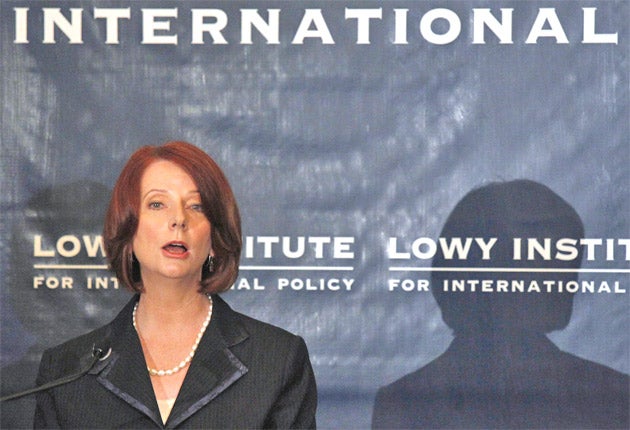Australia's new iron lady turns on migrants in bid for power

When Julia Gillard was first elected to parliament in l998, she was quick to challenge the idea that immigrants were a problem for Australia.
In her maiden speech, the future prime minister - a Welsh migrant herself - challenged the anti-Asian line of Pauline Hanson, the nationalist Right-winger whose views enjoyed widespread support at the time.
Ms Gillard told parliament that Ms Hanson, would "never understand that the vast majority of migrants come here determined to make a better life for themselves and for their kids and they are prepared to work unbelievably hard to achieve that dream".
They were bold words, and Ms Hanson and Ms Gillard have been as diametrically opposed as any pair of politicians in the past 20 years. But now that Ms Gillard has risen to leadership of the Labour party and the prime ministership after the sudden downfall of Kevin Rudd, something fundamental seems to have changed.
Yesterday, Ms Gillard called for a national debate on the asylum-seeker issue and issued a new crackdown on illegal migrants trying to enter Australia. While rejecting the Opposition's pledge to return to the so-called Pacific solution, in which, under the conservative John Howard government, asylum seekers were sent to Papua New Guinea and Nauru, she proposed an alternative which sounded remarkably similar.
Ms Gillard suggested a processing centre in East Timor or maybe New Zealand.
"The purpose would be to ensure that people smugglers have no product to sell," she said. "Arriving by boat would just be a ticket back to the regional processing centre."
Her explanation for this new government tack would have done her verbose predecessor Mr Rudd proud - even if it reversed his policies. She was "not interested in pursuing a new Pacific solution" but instead a "regional protection framework".
"Spot the difference from the Howard years, if any," one political observer commented. Spot the flaw too. Even East Timor's deputy prime minister, Jose Luis Guterres, insisted last night that it was too early to establish a processing centre.
The former head of Amnesty International, Irene Khan, also raised questions about Labour's new approach, claiming that offshore processing did not deter asylum seekers or people smugglers.
It is not a view that is shared by the Right-wing Liberal-led opposition coalition, which believes its hardline approach to illegal migrants during the decade-long Howard era put a stop to the flow of boat people arriving on Australian shores. And Ms Hanson herself is on the same page. Unsurprisingly enough, the Queensland firebrand believes the Labour Party should take a more robust stance against migrants, especially those arriving by boat.
She has even called on the government to cancel financial aid to Indonesia if it is unable to secure its borders and stop the flow of asylum seekers setting out for Australia.
The statistics make awkward reading for Ms Gillard, who is desperate to neutralise the problem ahead of the general election that is expected in the next few months. Since Labour won office in 2007, 143 boats carrying more than 6,500 asylum seekers have ended up in Australian waters, many of them being processed on Christmas Island, south of the Indonesian archipelago.
The influx has placed enormous pressure on detention centres on the island and the mainland, prompting many Australians to believe it is the direct result of the government's relaxation of border security.
The opposition leader, Tony Abbott, was quick to jump on the government's vulnerability yesterday. He unveiled his own immigration policy only minutes before Ms Gillard's announcement. "I have a simple message to the Australian people - if you want to stop the boats you've got to change the government," he said.
In addition to promising a return to the Howard government's so-called Pacific Solution, he also declared that asylum seekers who deliberately destroyed their identification documents would be automatically denied refugee status.
With both major parties in agreement that the boat people should be processed elsewhere, the imminent election campaign could turn into a battle between he or she who seems the toughest.
Ms Gillard has made it clear that she wants a rational debate where racism and political correctness are not an issue. "For people to say they're anxious about border security doesn't make them intolerant, it certainly doesn't make them racist, it means they're expressing a genuine view that they're anxious about border security," she added.
The irony is that the renewed debate on the boat-people issue places Ms Gillard, Mr Abbott and Ms Hanson in much the same camp. Ms Gillard may still believe that immigrants come to Australia to work unbelievably hard, but one thing is clear: at least until the election, she is unlikely to say anything of the kind.
Subscribe to Independent Premium to bookmark this article
Want to bookmark your favourite articles and stories to read or reference later? Start your Independent Premium subscription today.

Join our commenting forum
Join thought-provoking conversations, follow other Independent readers and see their replies